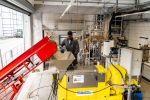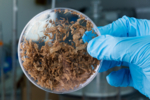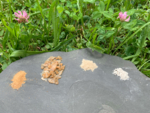-
-
Sustainable binder alternative - 18/12/2023
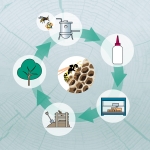
Plastic is all around us; and unfortunately, it is not going away any time soon. The search for more sustainable solutions is fully underway. However, binders that degrade only with difficulty or not at all are still used to bond natural materials such as wood and straw - not yet truly environmentally friendly. Fraunhofer researchers are working on an insect-inspired wood binder that makes bonded wood products both resistant and biodegradable.
https://www.biooekonomie-bw.de/en/articles/news/copied-insects-new-biological-wood-binder-under-development
-
-
Preventing waste from instant meals - 05/10/2023
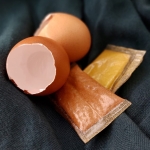
Many instant meals such as ramen soups have both a protective outer packaging and individual ingredients in small plastic sachets. To prevent this environmentally harmful waste, five students at the University of Hohenheim have developed a sustainable film based on eggshells and plant proteins that dissolves in hot water and is edible.
https://www.biooekonomie-bw.de/en/articles/news/edggy-edible-packaging-film-made-eggshell-waste
-
Food of the future: new production methods - 06/09/2023
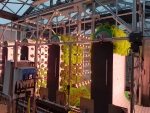
A rapidly growing world population and simultaneously rapidly shrinking arable land – these are just some of the major challenges facing the food industry. But how can solutions be found? Answers are being sought by the bioeconomy innovation space NewFoodSystems. Funded by the German Federal Ministry of Education and Research (BMBF), it is a network where science and industry can come together to develop sustainable food systems of the future.
https://www.biooekonomie-bw.de/en/articles/news/newfoodsystems-innovation-space-tomorrows-food
-
Press release - 30/08/2023
Rising sea levels due to climate change and artificial irrigation cause soil salinity to increase. This has a negative impact on agriculture, including viticulture. The plants die, yields decrease. Researchers of Karlsruhe Institute of Technology (KIT) have therefore studied a wild grapevine of higher salt tolerance. Their goal is to identify the genetic factors that make the grapevine resilient.
https://www.biooekonomie-bw.de/en/articles/pm/soil-salinity-wild-grapevine-defends-itself
-
-
-
Innovative materials - 14/06/2023

Conserving wood by producing furniture and other objects from wood-based materials with the help of microorganisms? That is exactly what a team of researchers from the University of Freiburg and the Leibniz Institute for New Materials (INM) in Saarbrücken is working on in the DELIVER project. The aim is to create a database of materials with a broad range of controllable properties for various applications that can be produced from wood waste.
https://www.biooekonomie-bw.de/en/articles/news/reinventing-wood-programmable-bacteria
-
-
-
-
Press release - 26/04/2023
Ready-made meals are ideal for quickly satisfying hunger. However, the quick snacks produce a lot of environmentally harmful plastic waste. To tackle this problem, the student team EDGGY from the University of Hohenheim in Stuttgart rolled up its sleeves and developed edible packaging made from eggshells and other plant-based raw materials. And even better: they simply dissolve in the hot water and can be eaten as an additional protein boost.
https://www.biooekonomie-bw.de/en/articles/pm/Simply-EGG-genious-Students-invent-edible-packaging-from-eggshells
-
Synergistic effects with microalgae and purple bacteria - 03/02/2023
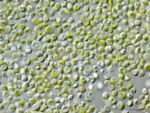
A biorefinery that uses industrial wastewater and residual material streams is being built in Rheinfelden (Baden). It will have two interlinking bioreactors and will synthesize biohydrogen as well as organic basic materials such as carotenoids and proteins. SmartBioH2-BW is a pilot project run by the Urban and Industrial Biorefineries initiative and funded by the Baden-Württemberg Ministry of the Environment, Climate Protection and Energy Sector.
https://www.biooekonomie-bw.de/en/articles/news/working-towards-hydrogen-economy-wastewater-biorefinery-smartbioh2-bw-project
-
-
-
-
Sustainable nutrition - 05/09/2022
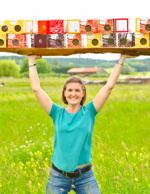
Insects on the dinner plate? Some people instantly dismiss the idea. Wrongly so, because in terms of animal welfare, ecological footprint and healthy nutrition, insect foods are much better than all other animal foods and are produced in a more controlled way. The fact that they can also taste really good is proven by the start-up Beneto Foods from Albstadt, which has developed protein-rich pasta in various flavours using cricket flour.
https://www.biooekonomie-bw.de/en/articles/news/insect-pasta-eating-healthily-and-improving-world-same-time
-
Project BW2Pro - 29/08/2022
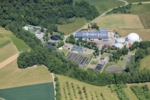
In 2020, Germany’s population collected over 5 million tonnes of biowaste. Most of this was composted, and some was fermented into biogas. Scientists in Baden-Württemberg think there's room for more. Within the project ‘Biowaste to Products’ (BW2Pro) they want to transform biowaste into new products in a biorefinery. The idea is to produce biodegradable plant pots, mulch material, fertilisers, enzymes and biobased plastics in addition to…
https://www.biooekonomie-bw.de/en/articles/news/biowaste-products-biorefinery-transforms-biowaste-new-products
-
-
pre-start-up company Wheyfinery - 13/04/2022
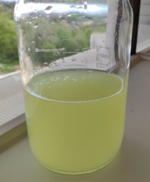
There is not much you can do with acid whey, which is why several million litres of it are disposed of every year. This is both costly and not sustainable. However, researchers at Tübingen University have shown: acid whey can be used to produce precursors for biofuels, fine chemicals and antimicrobial livestock feed additives. They have set up the pre-start-up company Wheyfinery in an endeavour to make their scalable biorefinery concept…
https://www.biooekonomie-bw.de/en/articles/news/acid-whey-valuable-raw-material-platform-chemicals-and-more
-
Lentil cultivation and cleaning on the farm - EIP-AGRI Rhizo-Linse project - 16/03/2022
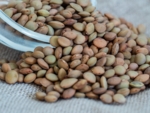
Lentils are among the oldest crop plants in Central European agriculture and were once a popular food in ancient Egypt, Persia and Mesopotamia. The legume was widespread in Germany until the mid-20th century, but has since disappeared completely from farmers’ fields. Over the past decade, lentils have reappeared as a crop grown locally and are cultivated in harmony with nature.
https://www.biooekonomie-bw.de/en/articles/news/lentils-return-heckengaeu-region
-
Alternative foodstuff ? - 09/03/2022
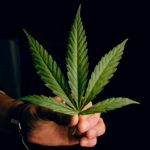
If there were a competition for the ‘crop of the future’, hemp would certainly be at the top. But not because of the intoxicating effect of some hemp varieties. Cannabis has the potential to help supply protein in the quantities required by a growing world population – in a sustainable way. The TASTINO project brings together researchers from academia and industry to work on ways to make the regional superfood available as a vegan alternative.
https://www.biooekonomie-bw.de/en/articles/news/hemp-regional-superfood-and-valuable-source-protein
-
Alpha-Protein GmbH - 27/07/2021
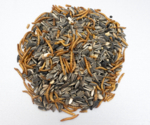
Mealworms instead of fish meal and soybean meal - this is what the sustainable future of feed production looks like as Alpha-Protein GmbH see it. The company has built a highly efficient automated production plant in which residual materials from local food production are used to breed mealworms.
https://www.biooekonomie-bw.de/en/articles/news/insect-farming-sustainability
-
Start-up kernique catch the zeitgeist - 29/06/2021
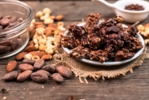
A delicious vegan nut snack that uses no sugar, artificial additives, gluten or palm oil, is full of essential nutrients, and is part of a commitment to environmental and social sustainability. Impossible? An Esslingen-based start-up called kernique proves otherwise. The start-up is currently planning a crowdfunding phase that offers a lucrative deal for investors. The idea catches the zeitgeist, but what exactly makes it stand out?
https://www.biooekonomie-bw.de/en/articles/news/nut-snack-sustainable-ecological-concept
Website address: https://www.biooekonomie-bw.de/en/search
